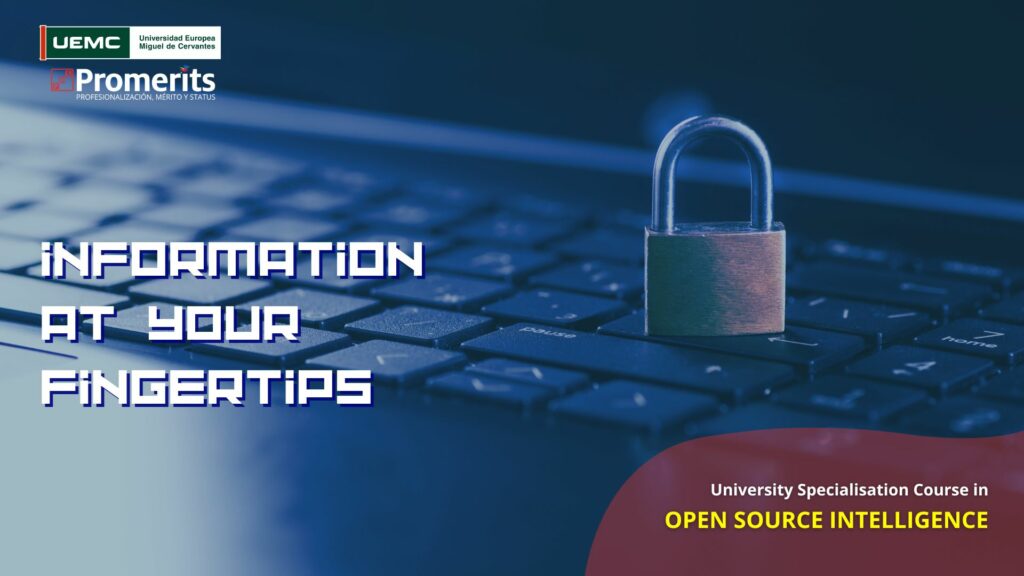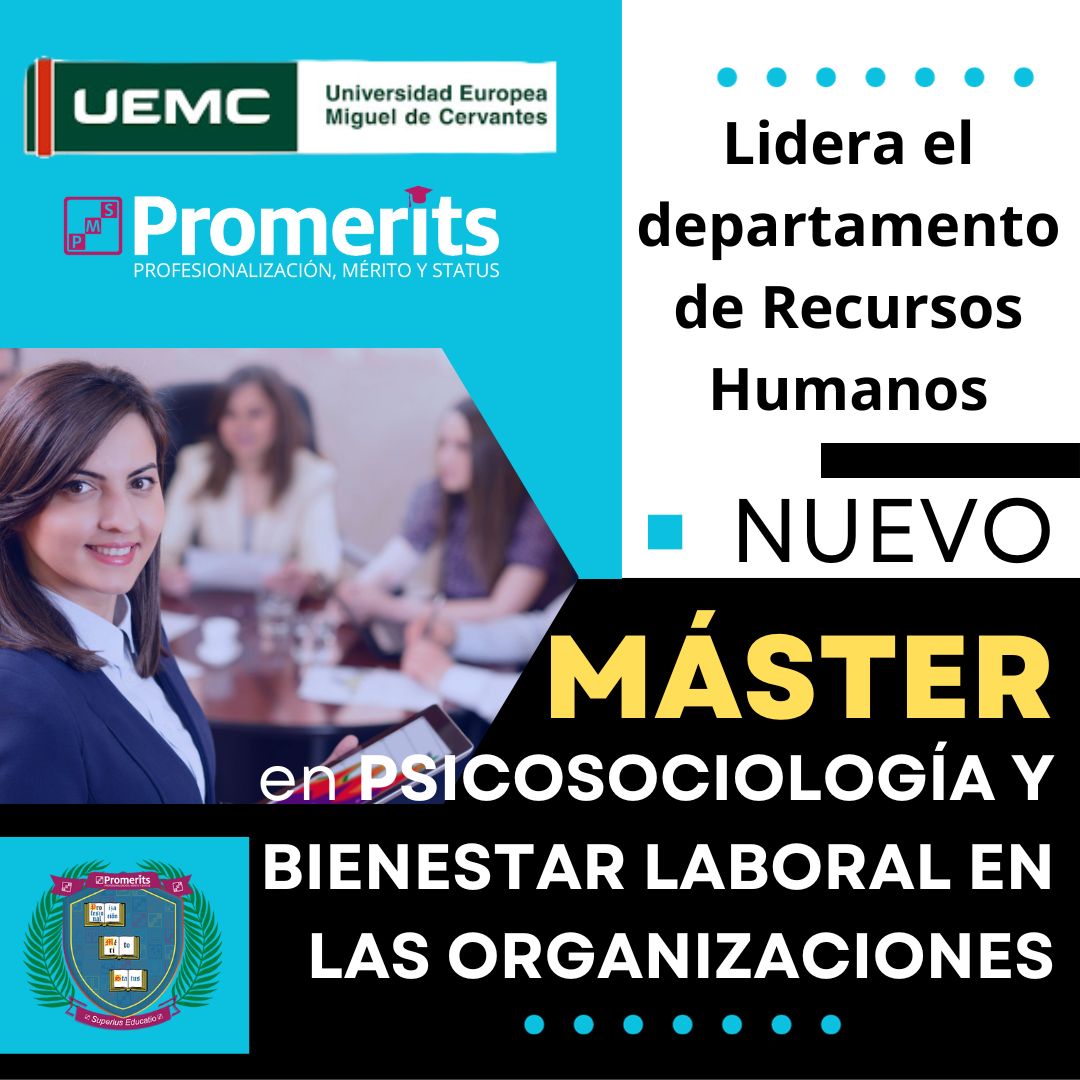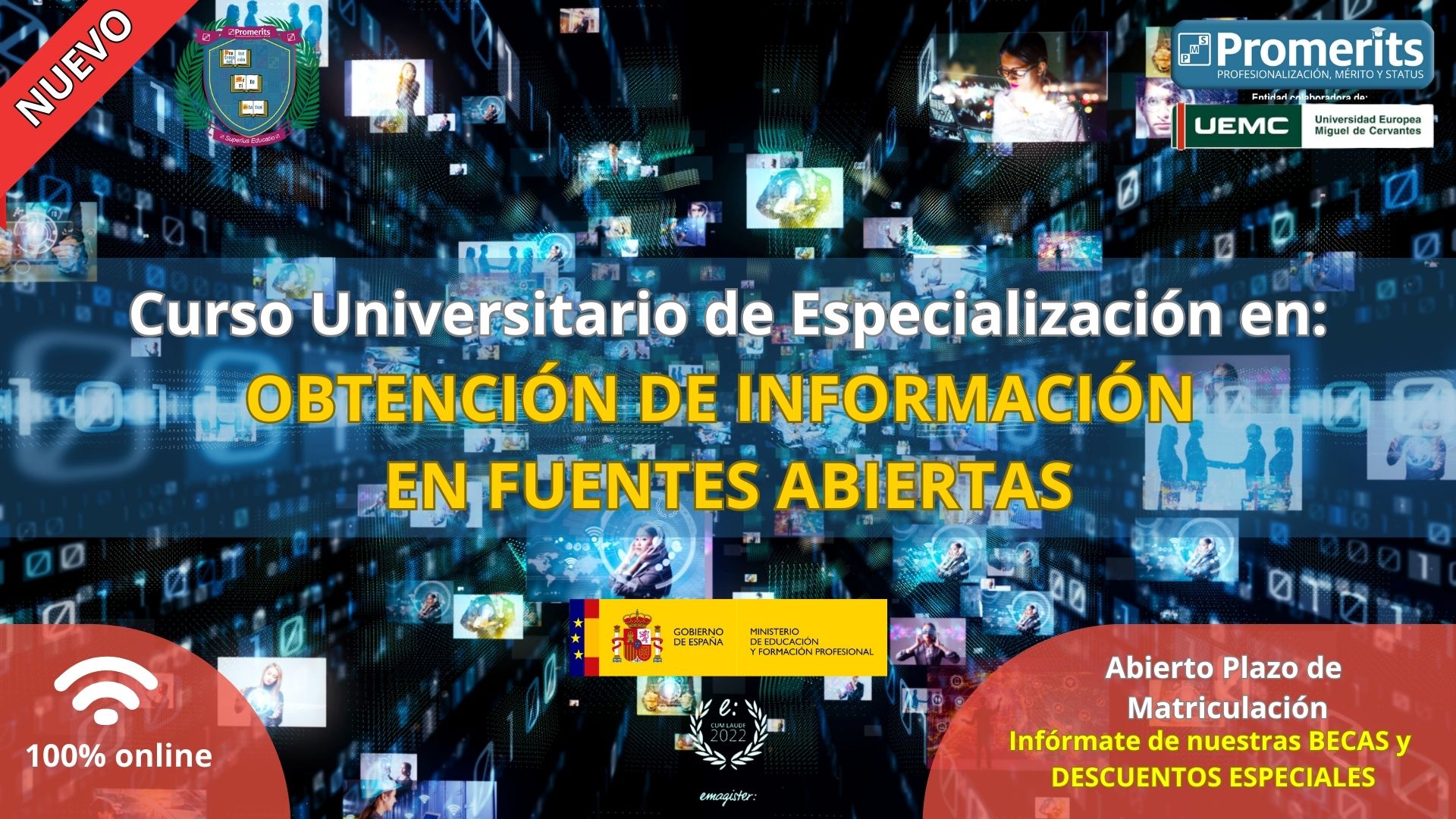

Only available in Spanish
The University Course in Open Source Intelligence (OSINT) aims to provide participants with the necessary skills to obtain useful information from various open sources available online and other public sources. This training course can be beneficial for various disciplines and professions, from intelligence and security to journalistic investigation and business management.
In summary, this course seeks to develop participants’ ability to obtain and analyse information from various open sources, enabling them to make informed decisions and improve their ability to meet their professional objectives.
Open Source Intelligence is essential and necessary training for any professional, as the correct search for data on people, companies, etc., is increasingly required in the human resources departments of large companies.
Objectives of this University Specialisation Course
Online multi-device platform. Our classes and workshops are recorded in the Virtual Classroom once delivered. There is no requirement to attend live sessions online. Access the course content at any time of the day.
Identify open information sources and how to access them.
Use search tools and analysis techniques to collect and filter relevant information.
Evaluate the quality and reliability of the information obtained.
Analyse and synthesise large amounts of information to detect patterns and trends.
Present the information clearly and concisely for use in reports and other final products.
Provide the necessary knowledge to deepen specific studies of open sources.
Provide our students with the necessary methodology to enable them to obtain the essential data required for conducting intelligent research. The student will learn to access valid information from numerous open sources, filtering and contrasting all necessary open sources.
Methodology applied to this University Specialisation Course
This is a fully online training through the virtual campus of UEMC (Universidad Europea Miguel de Cervantes), where the student will find all the study material necessary to complete the course.
Both classes and advisory workshops will be broadcast live via videoconference and available in the virtual classroom within 48 hours (from the live lesson broadcast) for subsequent on-demand viewing.
Online Multidevice
Videoconference Classes
Flexibility
12 ECTS
Personalised Advisory Follow-Up
Academic Programme
The concept of Open Source Intelligence is increasingly widespread among information analysts or those linked to the field of cybersecurity. This is because information has transformed from a traditional rigid model to a flexible technological model, where it is conceived as an essential value for decision-making.
The amount of data available in Open Sources is such that, by analysing these data, specific entities, threats, alerts, or current events could be proactively detected or analysed, all in real-time, without forgetting the option of searching for new markets, active clients, or voters by simply looking for that information in the “web space”.
Another concept is to use the data obtained from Open Sources to help maintain the digital security of the user or company, knowing the methodologies used by cybercriminals in their criminal campaigns, in line with the types and methods of investigation of our legal system.
MÓDULO 1. Inteligencia de Fuentes Abiertas.
MÓDULO 2. Creación de avatares.
MÓDULO 3. Entornos de investigación en alta tecnología.
MÓDULO 4. Uso avanzado de buscadores.
MÓDULO 5. Obtención de información online de entidades.
MÓDULO 6. Redes Sociales.
MÓDULO 7. Automatización mediante herramientas.
MÓDULO 8. Informe pericial en ciberseguridad.
MÓDULO 9. Bonus OSINT.
Target Audience
This training is especially aimed at Criminologists, technology investigators, public and private security professionals, human resources teams, or anyone who wants to acquire the necessary skills to obtain training in obtaining open sources and have an insight into the most common forms of cybercrime.
Certification
Upon completing the course, it will be possible to request the issuance of a certificate and/or diploma accredited by the Universidad Europea Miguel de Cervantes as a proprietary degree with 6 ECTS.
The University Specialisation Course in OBTAINING INFORMATION FROM OPEN SOURCES (OSINT) will be subject to validation for the annual subject of 12 ECTS of the Official Degree in Criminology.*
*Complying with the requirements established in Article 6 of Recognition and Transfer of Credits, of R.D 1393/2007, of 29 October, which establishes the organisation of official university education.
Faculty
At PROMERITS, we have an excellent faculty. All of them are professors, doctors (PhD), and/or senior executives in some of the main Spanish and multinational companies in the sector, with extensive teaching and research experience.
The University Specialisation Course in Open Source Intelligence (OSINT) is taught by Mr Pablo Luis Gómez Sierra.
Education:
- Degree in Criminology. Universidad a Distancia de Madrid.
- Master’s Degree in Information Technology Project Management. Universidad de Alcalá.
- Master’s Degree in Information Systems Engineering. URJC.
- University Specialisation in Security Technologies and Digital Investigation. Universidad de Alcalá.
- PhD candidate at Universidad de Alcalá. Special technological investigation measures of the Criminal Procedure Law.
Professional Experience:
- 20 years of experience in work related to cybercrime and digital security.
University Research:
- Member of the Research Group in Cybercriminology and Cybersecurity at Universidad a Distancia de Madrid.
- Member of the Research Group in Cybercriminology at the Professional College of Criminology of the Community of Madrid.
Certifications:
- Certification HOL-SEG10 R1 Ethical Hacking. Microsoft TechNet.
- Certification HOL-SEG10 R2 Hacker Countermeasures. Microsoft TechNet.
Most relevant publications:
- Gómez P.L. (2022). Police Technological Investigation Procedures against Cybercrime Actions in High-Tech Environments. Madrid: Dykinson.
- Gómez P.L. various authors (2021). “Practical Manual of Applied Criminology”. Aranzadi. ISBN 9788413913698
- Gómez, P.L. (2021). “Special Measures to Combat Organised Crime. Silent Monitoring of Computer Equipment”. Issue 1, January-March 2021 “LA LEY Privacy” Wolters Kluwer. ISSN 2659-8698
- Gómez, P.L. (2020). “Undercover in Cyberspace. The Online Undercover Agent”. Issue 6, December 2020 “LA LEY Privacy” Wolters Kluwer. ISSN 2659-8698
- Gómez, P.L., various authors (2020). “Operational Design of a Cyberattack on a Smart City”. Basic Manual in Cybersecurity and Data Protection. Exit Editorial S.L. ISBN: 978-84-9744-320-3, DL: M-28229-2020.
- Gómez, P.L., various authors (2020). “The Outbreak of Open Information”. Basic Manual in Cybersecurity and Data Protection. Exit Editorial S.L. ISBN: 978-84-9744-320-3, DL: M-28229-2020.
- Gómez, P.L. (2018). “Smart Cities as a Favourable Space for Offensive Actions of Cybercrime”, in Martínez Paricio, J. and Moreno Carrillo, J.M. (Coords.). Understanding the Present, Imagining the Future: New and Old Social Gaps. Rome-Messina (Italy): CORISCO Edizione, pp. 680-696. ISBN: 9788898138326.
- Gómez, P.L., various authors (2017). “Cybersecurity in the Public Sector”. Conclusions Document of the Public Sector Observatory – OSPI”. Madrid. IECISA.
- García, A. and Gómez, P.L. (2016). “Advanced Persistent Threats; Creating Terror and Chaos in the Essential Structures of Society”. Madrid: Security and Defence Conferences UDIMA.
Career Opportunities

Intelligence Departments in large companies

Security Departments

Crime Prevention and Investigation. State Security Forces and Corps. Armed Forces.

Detectives and Private Investigation Agencies

Criminologists

Intelligence Analysts and Private Intelligence Services

Law Firms of any speciality to properly prepare their cases

Lawyers in M&A operations in due diligence

Journalism Professionals

Technology Professionals
Scholarships
The University Specialisation Course in Open Source Intelligence has a scholarship system and special offers that cater to the needs of each student.
Do not hesitate to contact our academic advisors to learn about our scholarship programmes and combined degrees.
Consult all the information.





